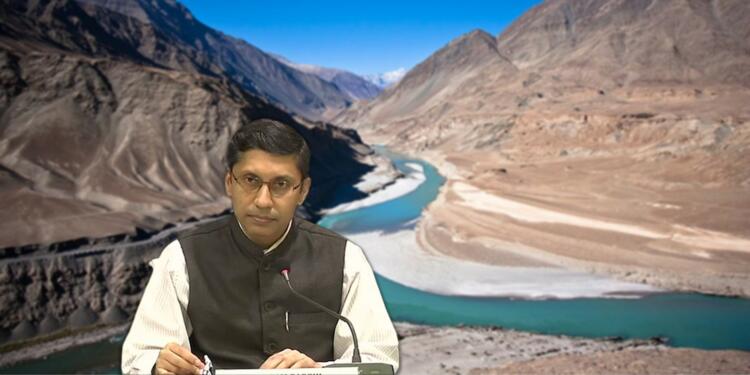Over the past 8 years of a solid central governance, India has effectively exposed and isolated Pakistan on the global stage. Its thriving economy and resulting dominance in international matters have given India the advantage to do so. Currently, India is targeting the Indus Water Treaty as a means to fully neutralize Pakistan. However, India must also confront Western domination in international organizations to fully achieve its objective.
Spokesperson of Jaishankar speaks
According to the latest reports, Ministry of External Affairs’ spokesperson held a media briefing on 2nd of February. While replying to a question on Indus Water Treaty and World Bank’s role, Arindam Bagchi said “I do not think they (World Bank) are in a position to interpret the treaty for us. It is a treaty between our two countries and our assessment of the treaty is that there is a provision of graded approach.”
The statement defines India’s stand on the notice sent by the Government to Pakistan. On January 25, India sent a notice to the Pakistani Government conveying its intention to amend the Indus Water Treat. To better understand the whole issue let us take step by step developments on treaty.
Indus Water Treaty: ups and down
In 1960, India and Pakistan reached an agreement on the Indus Water Treaty, which was brokered by the World Bank. Under the agreement, India was given control of the Beas, Ravi, and Sutlej rivers, while Pakistan was given control of the Indus, Chenab, and Jhelum rivers. As part of the Indus Water System, India could use 20% of the water while Pakistan was given access to 80%.
Almost after 2 decades, both India and Pakistan favoured reconsidering the treaty. While India had its own reasons for using only 20% water, Pakistan had been playing victim card of being neglected to use the water from Beas, Ravi and Sutlej.
Later, India announced 2 hydroelectric projects namely Kishenganga and Ratle hydroelectric plants. They were to be constructed on Kishenganga and Chenab River respectively. Pakistan objected to it and India, under the framework of treaty agreed to resolve the issue. According to the graded mechanism of the treaty, either a court of arbitration or the appointment of neutral expert can be made to resolve any issue.
Following that, Pakistan opted for a neutral expert to resolve the issue but when India agreed to it, Pakistan backed out from its stand and demanded court of arbitration to resolve the issue. The situation got even worse when the World Bank started both the processes concurrently. The stand of the World Bank is contradictory to the graded mechanism clause of the treaty. Hence India opted to send the concerned notice to amend the 62-year-old treaty.
Also read: Indus Water Treaty: India has set the timer on the balkanisation of Pakistan
Making the Indian stand clear, Arindam Bagchi said “The world bank itself, around five-six years ago, acknowledged the problem of having two parallel processes. Our interpretation and assessment are that this is not in consonance with the provisions of the treaty and hence we have been talking about a graded approach.”
The statement directly confronts the arbitrary attitude of the World Bank while dealing with the Indian issues. The Bretton Woods System has always been dominated by the west. According to many scholars, the development aid provided by them is actually the extended version of neo-colonialism. And that its organisations like the World Bank and IMF are adversary to third world countries in their approach.
Starting two independent parallel mechanisms to resolve a single issue under a single framework is not the call for solution but dispute. If India allows both the mechanism and they result in opposite solution, it will become more confusing and dispute oriented. So, the World Bank’s move looks discouraging and contradictory to the dispute resolving mechanism. The World Bank is not an organisation of naïve administrators that do not know what they are doing. They are doing it purposefully to give rise to another dispute between India and Pakistan. The malicious move also aims to break the Indian stand on other Indo-Pakistan disputes so that it can remain a relevant force.
There are several other issues between India and Pakistan and Kashmir is one among them. Pakistan always wanted to take it to international level but India firmly favoured a bilateral resolution. Indeed, India’s stand is resolute. Resolving a bilateral issue outside the bilateral framework is anything but stupidity. Apart from that, India’s changed and firm stand on Kashmir is stinging in the eyes of the West and Pakistan. India has time and again claimed that the whole of Kashmir is the integral part of India and any discussion, if takes place, will be on Pakistan occupied Kashmir (POK).
Inimical anti-Indian politics
The global dominance of India and the tremendous support it gets from the major portion of the world has put many state and non-state actors into the dilemma. The countries and the inter-governmental organisations that have anti-India agendas are neither able to digest India’s growth nor able to criticise it. So, they are fuelling former disputes with their anti-India agenda.
The sole purpose of this is to somehow demotivate India and divert its attention from development and growth to dispute and geo-political tensions. But, the recent statement by the spokesperson of MEA is a ray of hope that India is not losing its sight and its stand is pretty clear that the bilateral issues will only be resolved bilaterally.
So far Pakistan has not replied to the notice issued to it. And it will be interesting to see what unfolds after the notice period of 90 days ends.
Support TFI:
Support us to strengthen the ‘Right’ ideology of cultural nationalism by purchasing the best quality garments from TFI-STORE.COM

























